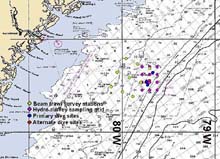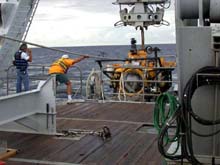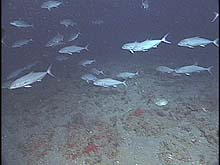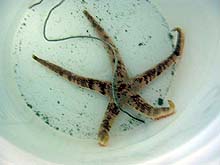
This map shows planned dive sites, hydrographic-survey sampling areas, and planned locations for beam-trawl survey stations at Savannah Scarp. The first dive occurred in an area known as "the sandwich." Click image for larger view.
The Clelia submersible was deployed into Savannah Scarp at 8 am on Sept. 7. A crew member maneuvers the line as the Clelia descends. Placing the submersible in the water is a carefully orchestrated process, and can be dangerous in the event that the line breaks away from the sub. Click image for larger view.
A school of greater amberjacks, a common fish in the Savannah Scarp area. Click image for larger view.
This starfish and sample of whip coral were collected at Savannah Scarp on Sept. 7. Click image for larger view.
Fish Abundance and Diversity at the Savannah Scarp
September 7, 2001
George Sedberry
Chief Scientist
Savannah Scarp Mission
The Savannah Scarp is a spectacular reef formation that provides habitat for reef organisms and includes two popular fishing reefs know as the "Sow Pen" and the "Deli." It is part of the "shelf edge" reef system, which is a discontinuous ribbon of reef at the edge of the continental shelf. At this "shelf break," the shallow continental shelf that stretches eastward of the beach begins to slope into the deep sea. From Cape Hatteras, NC, to Cape Canaveral, FL, a series of submarine ridges at the shelf edge creates irregular bottom topography that provides habitat for an abundant and diverse fish fauna. This fauna includes many species of economic importance, such as snappers, groupers, sea basses, grunts, porgies, tilefishes, and triggerfishes. The reefs at the shelf edge include large rocks that form jumbled, irregular hard-bottom reefs interspersed with sand.
Deep-water whiplike corals grow on the rocks, and numerous small, colorful wrasses, damselfishes, and butterflyfishes flit among the caves and crevices and probe the adjacent sand flats for food. Preliminary analysis of fishery data from the Savannah Scarp reefs indicates that this is an area of high abundance of vermilion snapper, speckled hind, scamp, and red porgy. The site includes a variety of habitats between depths of 150 to nearly 300 ft, and rocky ridges that extend more than 20 ft above the bottom. The presence of juvenile snowy grouper and speckled hind in fish catches indicates that the Savannah Scarp might be an important nursery habitat for deepwater groupers and other economically valuable fishes.
Dives conducted in the submersible Clelia will give fishery biologists, geologists, and other scientists firsthand observations and data on the occurrence of fishes associated with specific reef features, such as large rocks, crevices, flat hard bottom, and sand flats. Scientists will identify and count the fish while mapping the locations and types of bottom structures at this previously unexplored reef. The data collected will allow comparisons to important shallow reefs off Georgia, such as those at the Gray's Reef National Marine Sanctuary.
The Clelia submersible was deployed at Savannah Scarp at 8 am this morning, in an area called the "Deli," at depths ranging from 180-220 ft. Some of the observations included sharptail eel, starfish, whip coral, butterflyfish, wrasse, and starfish. Researchers hope to gain a better understanding of the habitat characteristics of fish here, and will be conducting DNA tests on gathered samples to examine differences between life at areas such as the Gray's Reef NMS, which is protected, and at Savannah Scarp, which is not.
Sign up for the Ocean Explorer E-mail Update List.














































